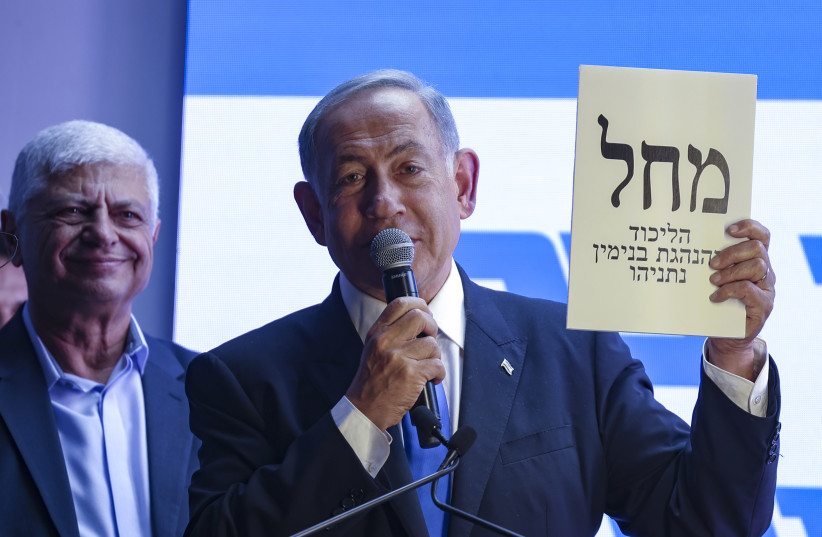Less than a week to go before the November 1 elections and Neta from the Elon Moreh settlement in the Samaria region of the West Bank doesn’t know for whom she will vote, even though she is a member of the Likud Party.
“Mostly, I vote for the Likud,” she said. Neta was happy to talk about politics, as she sat in the small mall on the edge of the Ariel settlement eating pizza with three of her children, but was reluctant to give her last name.
Neta, who wore a scarf over her hair and a dress, noted that, based on her clothing, it was clear that she was in the right-wing religious camp.
She explained that she has discounted Interior Minister Ayelet Shaked’s HaBayit HaYehudi Party because she feels that she has broken her promises too many times.
“I have no faith in her. She has broken our trust so many times that I no longer trust her. It’s possible that one can promise the voters one thing and do another once in office, but she has done that too many times,” Neta said.
“There are certain rules in politics, and she has crossed them,” Neta said.

It’s not as though Neta exactly trusts the other heads of the right-wing bloc, but she doesn’t feel betrayed by them in the same way.
Polls have shown that, countrywide, Benjamin Netanyahu is in the lead in this election, followed by Prime Minister Yair Lapid’s center-left Yesh Atid Party. Defense Minister Benny Gantz’s center-right National Unity Party is in third place, and MK Bezalel Smotrich’s right-wing Religious Zionist Party, whose party includes far-right politician Itamar Ben-Gvir, is in fourth place.
But in this small mall, with a supermarket and clothing stores, coffee and pizza shops, Lapid and Gantz are almost nonentities, and the battle is between Netanyahu and Smotrich, even among the undecided voters.
Likud has a foothold in West Bank settlements
Many of the settler leaders, including regional council heads such as Yossi Dagan of Samaria and Shlomo Ne’eman of Gush Etzion, are Likud members. Ne’eman also heads the Yesha Council, the umbrella organization representing communities in Judea and Samaria, in which there have been seven possible mandates, of which two were lost in the last election to apathy. Close to two mandates in ultra-Orthodox settlements also traditionally go to United Torah Judaism.
But on the ground, in settlements in the nationalistic camp, Smotrich has enormous support.
In a bid for more voters, both Netanyahu and Smotrich headed to the West Bank on Wednesday, to solicit support from those on the fence and those who are reluctant to head to the polls.
Neta said that she lives in “a home of Likud supporters,” so if she switches her vote, it would be only Smotrich. This is not the first time she has hesitated to cast a vote for the Likud. She was also torn in the 2021 election and can’t remember if she supported Netanyahu or Smotrich in the end.
“Vote Smotrich,” her seven-year-old son said, adding that he is “more trustworthy.”
Trust is a critical element here, Neta said.
“I’m of a generation that does not read the party platforms; we look at the people,” Neta said, adding that “people buy from people.”
The problem, she said, is that “I have no faith in the politicians or the system, so I don’t know.”
Certainly, it would help if politicians fulfilled their promises even when “the whole world is against them.” Likud Party head Netanyahu’s failure to keep his word about applying sovereignty to the settlements was one of the reasons she has thought about voting for another party.
GEULA OF Ariel said she is a clear Netanyahu supporter, while Racheli Picar of the Yitzhar settlement said that Smotrich has been her obvious choice, both now and in the past, because his ideology reflects her own.
Yiftah and Adi Kurzan of the Peduel settlement said they would vote for the Religious Zionist Party because they support Ben-Gvir.
“He has come to work,” Yiftah said, adding that his policies are ones they support, including “immunity for soldiers and police” and a strong deterrence.
Then there is his strong stance against terrorists, Adi said.
Rivki Levi of the Tapuah settlement said “I’m so disconnected that I have no idea,” but “probably Smotrich,” given that he is both honest and religious. “I voted for him last time also,” she said, even though she was concerned by Ben-Gvir, who she felt was too extreme. If Ben-Gvir were running alone, “I would not vote for him,” she said.
Vicki Shychman from Ariel said she does not follow the news and would likely take advice from friends with the same values. Last time, she said, she voted for Gantz, but she doesn’t know if she will do so again.
Leon from the Eli settlement said he is “tired of politics in Israel” and didn’t have anyone specific he wanted to support.
The only party that caught his attention was Economic Freedom, but he already knows that it will not receive the minimum number of votes needed to be awarded Knesset seats.
“So, I am stuck with no real options,” he said, as he sat working on his computer at a coffee shop, wearing a floral short-sleeved shirt and jeans.
In the last election he voted Likud, but now he thinks the country “has to move on.”
He added, “I don’t see a positive vibe from [Netanyahu]. I don’t see something that is striving for something better or change, just more of the same small politics.”
Netanyahu, therefore, is out of the question. So is Smotrich, Leon said, adding that he has weighed a vote for Lapid or Yisrael Beytenu head Avigdor Liberman.
In the end, however, no matter what he chooses, Leon said, it’s likely that Netanyahu “will be the next prime minister.”
